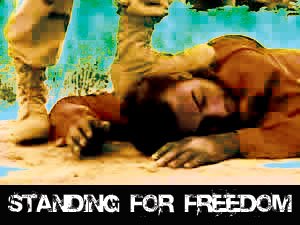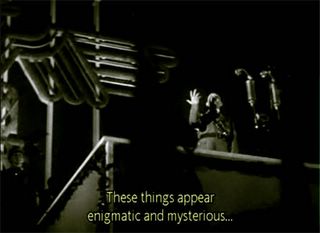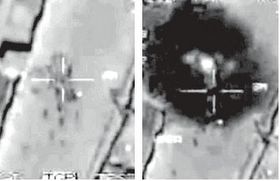db: Bush and friends have been gearing up for '2000' for some time - and no doubt have a wealth of platitudes and patriotic perversions ready to justify the obliteration of so much US youth.
To guard against any sloppy repetition of last years inspiring soundbites we have a top twenty [or whatever] below - in no particular order - from Bush, Rumsfeld, and the usual suspects.
Note: At Cryptome the number already exceeds 2000 considerably
From
CNN"Going on the offensive against terrorism has it's cost" - Rumsfeld
"Their sacrifices will not be in vain." - Rumsfeld
"We are committed to making the right decision in Iraq and the right decision for them at home, and that is the way we will honor their sacrifice," John Kerry
MSNBC"We will honor their memories by completing the mission." GW Bush
"The stakes are whether or not...people can simply kill others, innocent people, in order to impose their will.... Colin Powell
NYdailynews"My promise to them is that we will complete the mission so that their child or their husband or wife has not died in vain," GW Bush
BBC"We remember, honor and mourn the loss of all those that made the ultimate sacrifice defending freedom," Scott McClellan
"Tragic milestone" John Kerry
CNN"It should be noted that the civilized world passed the thousandth casualty mark a long time ago,Hundreds were killed in Russia last week. And this week, of course, on September 11, 2004, we remember the 3,000 citizens of dozens of countries who were killed on September 11 in 2001." Rumsfeld
CBS"We're still on the offense here in this country. We're chasing down these killers overseas so we don't have to face them here at home."..... "We're making good progress," Bush
"We knew this would be a difficult time,"...... "We said once the transition to Iraqi leadership took place, the insurgents would come after that leadership and come after us. And we'll have to deal with it and we will deal with it." Colin Powell
"The progress has prompted a backlash, in effect, from those who hope that at some point we might conclude that the pain and the cost of this fight isn't worth it," Rumsfeld
"We must never forget the price they have paid. And we must meet our sacred obligation to all our troops to do all we can to make the right decisions in Iraq so that we can bring them home as soon as possible," John Kerry.
SF Gate"The next phase will be the run-up to the elections,the insurgents will have to stage an offensive...keyed to influence the U.S. election. That's a no-brainer. We can expect it to continue up to the election." Retired Army Col. Robert Killibrew,
"Americans won't flinch. Our enemies underestimate us" Rumsfeld
"American society has shown a remarkable willingness to sustain casualties...To the extent people have turned against the war, it's because of revulsion against incompetence and defeats" Eliot Cohen - Johns Hopkins University
Telegraph"We're still on the offensive here in this country. We're chasing down these killers overseas so we don't have to face them here at home." GW Bush
"We mourn every loss of life" GW Bush
CBS"Our enemies have underestimated our country, our coalition ... certainly our commander in chief," Rumsfeld
"The enemy is becoming more sophisticated,this has lead to the recent spike in casualties" Richard Myers
washingtonpost"The real issue is the fact that this enemy we have out there has the capacity to regenerate itself, it's doing so because of the disenfranchisement of a certain number of Muslims, the despair they feel in lack of quality of life improvement, and the sense of nationalism they also feel." Retired Army Gen. John Keane
"When combined with U.S. losses in other theaters in the global war on terror, we have lost well more than a thousand already"
"We certainly honor the courage and sacrifice of every man and woman in uniform who has served in Iraq and who is currently serving there." Rumsfeld
CBS"The progress has prompted a backlash, in effect, from those who hope that at some point we might conclude that the pain and the cost of this fight isn't worth it," GW Bush
"Well, our enemies have underestimated our country, our coalition. They have failed to understand the character of our people. And they certainly misread our commander in chief." Rumsfeld
"Today marks a tragic milestone in the war in Iraq. More than one thousand of Americas sons and daughters have made the ultimate sacrifice. Our nation honors their service and joins with their families and loved ones in mourning their loss," John Kerry
Marine ClubAs of yesterday there were 806 troops that had been killed in action. The number of 1000 plus includes those who died of non-battle injuries - while in Iraq. Certainly every death is regrettable, but the services have people die, worldwide, virtually every day to some form of accident or illness. LtGen. James T. Conway
db: In memory of all the dead - especially those killed by amoral politicians and terrorists from all camps:
The vanquished know war. They see through the empty jingoism of those who use the abstract words of glory, honor, and patriotism to mask the cries of the wounded, the senseless killing, war profiteering, and chest-pounding grief. They know the lies the victors often do not acknowledge, the lies covered up in stately war memorials and mythic war narratives, filled with stories of courage and comradeship. They know the lies that permeate the thick, self-important memoirs by amoral statesmen who make wars but do not know war. The vanquished know the essence of war - death. They grasp that war is necrophilia. They see that war is a state of almost pure sin with its goals of hatred and destruction. They know how war fosters alienation, leads inevitably to nihilism, and is a turning away from the sanctity and preservation of life. All other narratives about war too easily fall prey to the allure and seductiveness of violence, as well as the attraction of the godlike power that comes with the license to kill with impunity. But the words of the vanquished come later, sometimes long after the war, when grown men and women unpack the suffering they endured as children, what it was like to see their mother or father killed or taken away, or what it was like to lose their homes, their community, their security, and be discarded as human refuse. But by then few listen. The truth about war comes out, but usually too late. We are assured by the war-makers that these stories have no bearing on the glorious violent enterprise the nation is about to inaugurate. And, lapping up the myth of war and its sense of empowerment, we prefer not to look.
- Chris Hedges





 When they have dispatched the madman before he can finger his erstwhile pals in the US and here, I really do hope that our young war criminal and his friend in the Oval Office can be held in Abu Ghraib - it's just outside the Green Zone and can be accessed in half an hour - with the jailers picked by Rumsfeld, and before facing a new set of judges with a Sunni on the panel. I'd be quite happy to have my two Harvard friends from all these years ago, Sam Shearer and Dave Peterson, people who actually understand Iraq, perform that function.
When they have dispatched the madman before he can finger his erstwhile pals in the US and here, I really do hope that our young war criminal and his friend in the Oval Office can be held in Abu Ghraib - it's just outside the Green Zone and can be accessed in half an hour - with the jailers picked by Rumsfeld, and before facing a new set of judges with a Sunni on the panel. I'd be quite happy to have my two Harvard friends from all these years ago, Sam Shearer and Dave Peterson, people who actually understand Iraq, perform that function.






